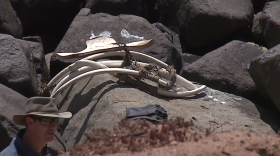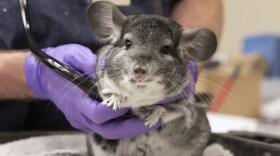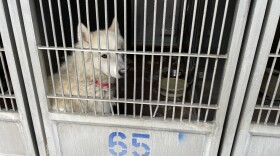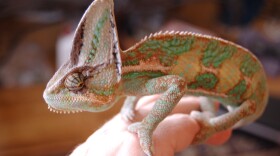-
A former veterinarian claims in a lawsuit that San Diego county's animal shelter mistreated dogs by leaving them in unheated kennels, calling the dogs "ice puppies."
-
KPBS Midday EditionA new book, "How To Speak Cat: A Guide To Decoding Cat Language," co-authored San Diego Humane Society President Gary Weitzman, aims to help cat lovers better understand their feline friends.
-
The effort was a training exercise and a public service to help the San Diego Natural History Museum's research on whales.
-
A Vista judge dismissed a defamation lawsuit filed by an elderly chinchilla rancher against the animal rights group People for the Ethical Treatment of Animals.
-
Protesters are asking Mayor Kevin Faulconer to better train officers after a pit bull was fatally shot in Pacific Beach last weekend.
-
Carlos reminded me he was far from an anomaly, as tens of thousands of service members continued to return home from combat, forever altered by what they had seen and experienced in war. He wanted the people who read the blog posts I wrote to know this. That was why he told me his story.
-
Carlos told me he and Logan had been to only one public sporting event since returning from Iraq. It was another Padres game, and the experience drained him.
-
Carlos said he knew Logan had a better sense of smell and hearing than he did, and trusted Logan to alert him of any danger – be it real or imagined - which allowed the Marine veteran to relax, even if only a little bit.
-
Carlos, who served in the Marines as a leader, teaching fellow Leathernecks the tools they’d need to survive in the war zone, decided to become a full-time trainer at Freedom Dogs, teaching Marines with PTSD how to survive their war wounds.
-
When Carlos first started attending training sessions at Freedom Dogs, he felt he didn’t fit in. Big reason: Carlos was afraid of dogs. He didn’t like them, and he believed they didn’t like him. In the tough, gang-infested Chicago streets where Carlos grew up, dogs were treated more as weapons than pets.
RELATED STORIES
-
-
-
-
-
-
-
KPBS Midday Edition
-
-
Sign up for our newsletters!
Keep up with all the latest news, arts and culture, and TV highlights from KPBS.
- San Diego proposes keeping low-density housing near Clairemont trolley stops
- San Diego Zoo mural honors 3 beloved animals lost in 1 week
- Buried audit found major problems at San Diego County animal shelters. Issues still persist
- Activists want state commission to consider decertifying SDPD chief
- Hundreds still without power in the Imperial Valley after Monday's monsoon storms























